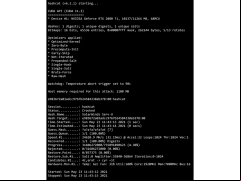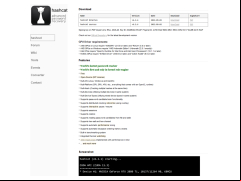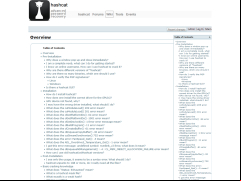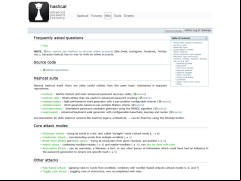
hashcat
by hashcat
hashcat is an advanced U-based recovery tool designed to brute-force and dictionary attack hashes.
Hashcat is a recovery tool used to recover lost or forgotten s. It is an open source tool designed to assist s in recovering their s. Hashcat is the most advanced recovery tool available. It uses a variety of techniques to recover s including dictionary attacks, brute force attacks, rainbow tables, and more.
Hashcat provides a powerful suite of features that make it a valuable tool for s who need to recover s. Hashcat can be used on both Windows and Linux operating systems. It s a variety of hash algorithms, including MD5, SHA1, SHA256, SHA512, NTLM, and many more. It is also capable of cracking s of any length, making it an ideal tool for recovering long and complex s.
Hashcat also offers a wide range of customization options for s. It can be used to generate custom wordlists for dictionary attacks or to set specific rules for brute force attacks. Hashcat also offers a graphical interface (GUI) which makes it easy to access the features of the tool.
Hashcat also offers extensive for a variety of graphics processing units (GPUs). This allows s to take advantage of the processing power of GPUs to accelerate the cracking process. Hashcat also offers for distributed cracking, allowing s to spread the work of cracking s across multiple computers.
The main features of Hashcat include:
• for numerous hash algorithms
• Ability to crack s of any length
• Customizable wordlists and rules for dictionary and brute force attacks
• Graphical interface
• for multiple GPUs
• Distributed cracking
• Extensive documentation and
• Open source code available for
Hashcat provides a powerful suite of features that make it a valuable tool for s who need to recover s. Hashcat can be used on both Windows and Linux operating systems. It s a variety of hash algorithms, including MD5, SHA1, SHA256, SHA512, NTLM, and many more. It is also capable of cracking s of any length, making it an ideal tool for recovering long and complex s.
Hashcat also offers a wide range of customization options for s. It can be used to generate custom wordlists for dictionary attacks or to set specific rules for brute force attacks. Hashcat also offers a graphical interface (GUI) which makes it easy to access the features of the tool.
Hashcat also offers extensive for a variety of graphics processing units (GPUs). This allows s to take advantage of the processing power of GPUs to accelerate the cracking process. Hashcat also offers for distributed cracking, allowing s to spread the work of cracking s across multiple computers.
The main features of Hashcat include:
• for numerous hash algorithms
• Ability to crack s of any length
• Customizable wordlists and rules for dictionary and brute force attacks
• Graphical interface
• for multiple GPUs
• Distributed cracking
• Extensive documentation and
• Open source code available for
Hashcat enables s to perform highly efficient and accelerated cracking using advanced methods and techniques.
The minimum hardware requirements for hashcat are:
- A U with at least 2 cores
- A minimum of 4GB of RAM
- A graphics card with at least 1GB of dedicated video RAM
The minimum software requirements for hashcat are:
- Linux, macOS, or Windows operating system
- The latest version of hashcat installed
- An internet connection (for ing the latest version of hashcat)
- A U with at least 2 cores
- A minimum of 4GB of RAM
- A graphics card with at least 1GB of dedicated video RAM
The minimum software requirements for hashcat are:
- Linux, macOS, or Windows operating system
- The latest version of hashcat installed
- An internet connection (for ing the latest version of hashcat)
PROS
s a wide variety of hashing algorithms.
Extremely fast cracking tool.
Highly customizable with flexible attack modes.
Extremely fast cracking tool.
Highly customizable with flexible attack modes.
CONS
Requires knowledge of command line to operate effectively.
High system hardware requirements for optimal use.
No graphical interface provided.
High system hardware requirements for optimal use.
No graphical interface provided.
Muhammad S.
1. Hashcat is a powerful recovery tool. 2. It is fast, efficient and s a wide range of algorithms. 3. It has a nice interface and is easy to use. 4. It has a great online community with plenty of resources. 5. It can be used to crack multiple hashes at once. 6. It s GPU acceleration to speed up the process. 7. It is also compatible with multiple operating systems. 8. The cost is reasonable compared to the value it provides. 9. It s the use of wordlists and masks for more advanced attacks. 10. The software is constantly updated with new features and improvements.
Jayden Andria
1. Hashcat is a powerful and easy to use recovery software. 2. It can be used for multiple types of hashes and it also s GPU acceleration. 3. The interface is straightforward and the documentation is very clear and helpful. 4. I found that the cracking speed is quite fast compared to other tools. 5. The is also very good and the community is active.
Aaron N.
Hashcat is a powerful cracking tool that enables s to recover lost or forgotten s for various encrypted formats, including MD5, SHA-1, and WPA/WPA2. It uses a combination of brute-force and dictionary attacks to crack s quickly and efficiently. Hashcat s multiple platforms and can run on both U and GPU hardware. It also has a number of advanced features, such as session saving and restoration, rule-based attack customization, and distributed cracking capabilities. Overall, Hashcat is a valuable tool for security professionals and researchers who need to test the strength of their s and encryption methods.
Finlay Schwinghamer
Hashcat software is a powerful tool for cracking hashes using various techniques and algorithms.
James
Hashcat is an advanced recovery tool, appreciated for its robust functionality and efficient performance. It's recognized for its versatile nature, being able to execute a multitude of attack modes. One of its crucial features includes its ability to utilize multiple platforms such as Us, GPUs, DSPs, and more to accelerate the recovery process. Furthermore, it s a large number of hashing algorithms.
Cole
It's an incredibly powerful tool for recovery, with a highly configurable setup and broad compatibility.
Blair
Efficient recovery, s multiple hashing algorithms.
Oliver
Powerful, versatile cracking tool.
Dylan
It is an excellent tool for recovering lost or forgotten s, designed to assist s in this recovery process. Highly advanced, it uses various techniques to retrieve s, such as dictionary attacks, brute force attacks, rainbow tables, and many more. It offers powerful features, such as the ability to be used on both Windows and Linux, and s different hashing algorithms, from MD5 to SHA512 to NTLM. It can even crack s of any length, making it an ideal tool for recovering long and complex s. In addition, it offers a wide variety of customization options: s can generate customized word lists for dictionary attacks or define specific rules for brute force attacks. Its graphical interface makes accessing its features easily accessible, not to mention that it offers extensive for various graphics processing units (GPU), allowing s to speed up the cracking process. And to top it all off, it s distributed cracking, allowing the cracking work to be distributed across multiple computers.







